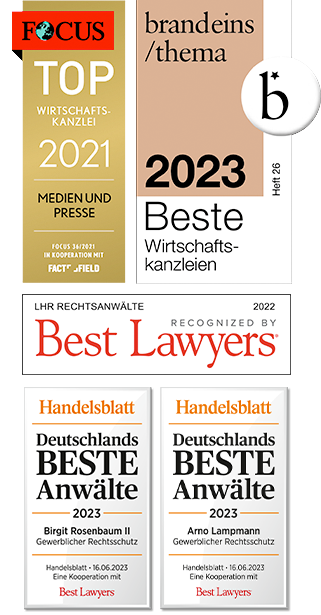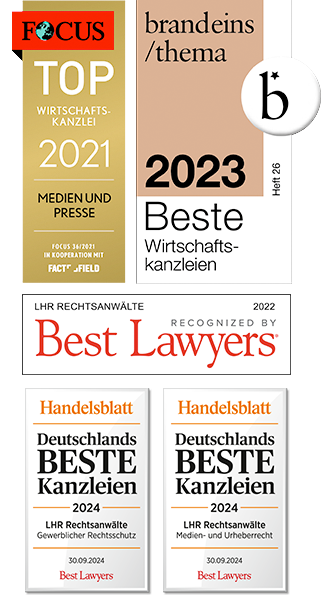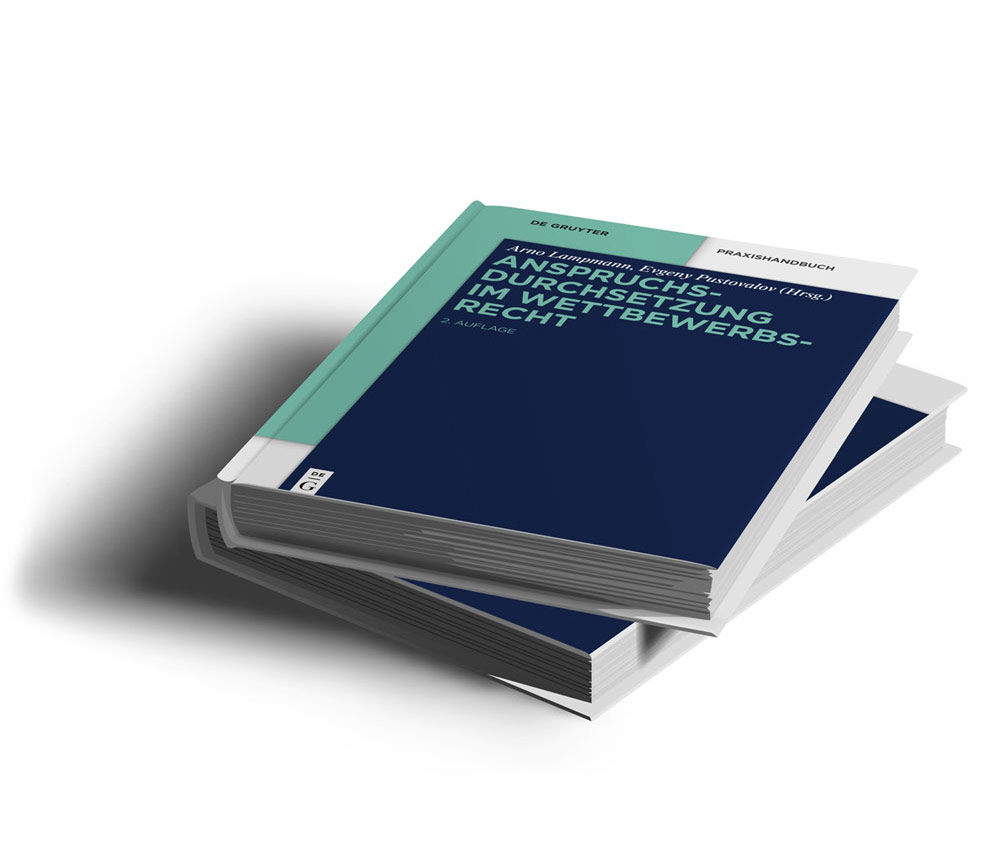Contracts are of paramount importance in our lives. Everyone concludes contracts almost every day. Whether it's buying bread in the bakery in the morning, at the checkout in the supermarket or at the gas station, contracts are an integral part of our everyday lives.
In entrepreneurial business transactions, contracts are particularly important due to their complexity. For example, if a photographer wants to make his works available to another person, he will conclude a license agreement. Examples can be found for almost all areas of law. Even sports law, for example, cannot do without contractual provisions.
Overview
- Principles of contract law
- Subject of regulation of contract law
- Different types of contracts
- Which contracts do we specialize in?
- Trademark license agreements
- Copyright license agreements
- Agreements on contractual penalties
- Supplier, sponsoring and agency agreements in sports law
- Contractual non-competition clauses in employment law
- Protection of trade secrets through non-disclosure agreements
- Contracts with processors according to Art. 28 (3) GDPR
- Our services in the field of contract law
Principles of contract law
In Germany, the principle of freedom of contract applies. It is up to each party to decide whether and with whom to conclude a contract (so-called freedom to conclude a contract) and what its content should be (so-called freedom to form a contract). The parties act in a privately autonomous manner. The principle of private autonomy is guaranteed by the German Basic Law (Article 2 (1) German Basic Law). A contracting obligation – the obligation to conclude a contract – exists only in absolute exceptional cases.
Sections 134 and 138 of the German Civil Code set limits to freedom of contract. According to these, a legal transaction may not violate a legal prohibition or morality. In addition, there are often special protective provisions – particularly for the benefit of consumers – which must be observed.
In accordance with the principle of freedom of form, contracts can in principle be concluded free of form. However, numerous provisions deviate from this principle. For example, under Section 311b of the German Civil Code (BGB), contracts for the sale of real estate must be notarized. Formal requirements primarily have an evidentiary and warning function.
Subject of regulation of contract law
Contract law primarily regulates the formation and validity of contracts.
Conflicts arise above all when breaches of contract occur as part of the contract processing. Here the question arises as to what legal consequences occur and whether one party is entitled to claims against the other party. If, for example, one party breaches an obligation incumbent upon it under a contract because it fails to perform a service correctly or fails to perform it at all, the other party may be entitled to claim damages under Section 280 BGB (possibly in conjunction with other provisions). A reversal of the contract after declaration of withdrawal (Section 349 BGB) may also be considered, Section 323 BGB in conjunction with Section 346 BGB.
Different types of contracts
A distinction is made between so-called typical and atypical contracts. In contrast to atypical contracts, typical contracts are regulated by law. The best-known examples of a typical contract from everyday life are the purchase contract (Section 433 BGB) and the rental contract (Section 535 BGB). Atypical contracts would be, for example, leasing or guarantee contracts.
If a contract has characteristics of different types of contracts, it is called a mixed contract.
The type of contract is determined by the content of the contract. The contract designation by the parties is not decisive.
Which contracts do we specialize in?
We have specialized in a few areas of law and the typical contracts in these areas.
Trademark license agreements
By means of a license agreement, the licensor grants a license to the licensee. A license is understood to mean permission to use certain intellectual property rights under certain conditions, to which the holder of the intellectual property right has an exclusive right.
Trademark license agreements entail risks for both licensors and licensees:
The problem for the licensor is that the protected sign must be used by him or the licensee within the first 5 years after registration (so-called compulsory use). If this does not happen, anyone can file a request for cancellation due to non-use.
Licensees must ensure that they comply with their contractual obligations arising from the permission to use.
Copyright license agreements
The german Copyright primarily protects the author. If the author grants rights of use (licenses) to his works by means of a license agreement, the licensees entitled to use them are also protected. The license agreement allows the licensee to exercise the author’s rights to the extent authorized. The license agreement protects the licensee from a warning notice or a legal dispute.
Agreements on contractual penalties
Warnings are mainly known from labor law. However, a warning is not only threatened if you violate an obligation from your employment contract. A warning can also be issued for trademark infringement, copyright infringement or unfair competition.
But what is a warning and what do you have to expect in this case? The warning asks you to refrain from a certain action or behavior. If you don’t do so, you are expected to pay a contractual penalty. The amount of this contractual penalty can be agreed. However, it can also be set unilaterally at the discretion of the rights holder. In both cases, the contractual penalty is intended to put pressure on you to prevent any future infringement.
The great advantage of the contractual penalty is that the injured party – unlike in the case of a claim for damages – does not have to prove either the occurrence of the damage or the amount of the damage. However, the contractual penalty is only forfeited if the infringer can be accused of fault. This is already the case if he has disregarded the care required in legal communication. In this case, he acts negligently, Section 276 (2) BGB.
If you wish to issue a warning to another person, you should exercise caution in the wording of the penalty-based cease-and-desist declaration. If the wording is unfortunate, e.g. too terse, there is a risk that the contractual penalty will not be forfeited. You will then miss out on a not inconsiderable financial amount. The warning does not have the desired effect.
Supplier, sponsoring and agency agreements in sports law
In sports law, supplier agreements, sponsoring agreements, promotion agreements and agency agreements play a major role.
The supplier contract is a special form of the classic sponsorship contract. It is an individual agreement between a sports equipment manufacturer and an athlete. The sponsor usually provides the sponsored party with material resources to promote its sports activities. The sponsored party undertakes to support the sponsor’s communicative objectives through the development of the sponsored activities.
The sponsoring agreement cannot be assessed unambiguously from a legal point of view. It is characterized on the one hand by the sponsorship service and on the other hand by the communicative consideration.
Contracts with players’ agents must be distinguished from contracts with players’ consultants. The players’ agent is a broker (cf. sections 652 et seq. BGB). His main duty to perform is to provide the player with the opportunity to conclude a contract (e.g. with a club). However, the players’ agent only receives his salary if the contract is actually concluded as a result of the brokerage, cf. section 652 (1) BGB.
Contracts with player consultants are generally service contracts within the meaning of Section 611 of the German Civil Code (BGB). The player consultant organizes the player’s daily life or social media presence, for example. This allows the player to focus on the sporting side of things.
Contractual non-competition clauses in employment law
Competitors entice qualified workers away from their rivals with the help of more attractive working conditions. This happens especially when qualified workers have special know-how, insights into the work process and customer contacts. Or qualified workers use their learned expertise to start their own business.
Both scenarios cause great annoyance to the original employer. He has invested a lot of time and effort in training the employee. Nevertheless, he loses his workforce. In addition, he suffers a loss of sales. This is because the rogue employee will regularly use his semi-skilled knowledge and skills for activities that compete with the original employer’s business.
The question arises as to how the employer can protect himself in this situation. The solution is a contractual non-competition clause.
The scope of this depends on the agreement reached with the employee. Only those competitive transactions can be prohibited which impair the legitimate interests of the employer, Section 74 a (1) Sentence 1 of the German Commercial Code (HGB).
In terms of content, a distinction is made between so-called activity-related and company-related non-competition clauses. The activity-related non-competition clause prohibits one or more specific activities. The company-related non-competition clause generally goes beyond this. It prohibits any activity in one or more specific companies.
The employer is obligated to pay the employee a so-called waiting allowance. Its minimum amount is regulated in Section 74 (2) HGB.
A contractual non-competition clause can be both void and non-binding. This can have various causes and different legal consequences.
Protection of trade secrets through non-disclosure agreements
Public disclosure of trade secrets may jeopardize the existence of the employer. For this reason, measures should be taken urgently to protect trade secrets. This is also necessary because otherwise the employer cannot claim the protection of the German Business Secrets Act (GeschGehG).
Non-disclosure agreements bind employees, for example. They are intended to ensure that company secrets are protected. A breach of a non-disclosure agreement leads to a violation of law pursuant to Section 4 (2) No. 2 or 3 in conjunction with Section 2 No. 3 GeschGehG. If a breach of non-disclosure agreements can be proven, this is generally sufficient to justify claims under Sections 6 et seq. of the GeschGehG. Such as claims for damages pursuant to Sec. 10 (1) GeschGehG.
Non-disclosure agreements can in principle be agreed with all persons who have access to trade secrets. It should be noted that a corresponding agreement is not required in every case.
Contracts with processors according to Art. 28 (3) GDPR
The application of the General Data Protection Regulation (GDPR) has given the issue of data protection a whole new urgency. It also regulates so-called processing.
Art. 4 No. 8 GDPR defines the term “processor” as follows:
‘processor’ means a natural or legal person, public authority, agency or other body which processes personal data on behalf of the controller
These can be foe example external customer centers, external data centers or other external service providers.
The processor acts on the basis of a contract that it concludes with the client. The requirements to be met by the contract can be found in Art. 28 (3) GDPR.
Accordingly, the contract must stipulate, for example, that the processor will only process personal data on documented instructions and that the processor will ensure technical data protection. Furthermore, the contract must stipulate that the processor has to generally delete or return all personal data after completion of the processing. If a processor uses the services of another processor, the contract should require the processor to obtain prior authorization from the principal. For further regulations to be complied with in the contract, reference is made to Art. 28 (3) GDPR.
Our services in the field of contract law
- Examination of trademark and copyright license agreements
- We enforce or defend against claims arising from license agreements
- Support in granting rights of use (licenses)
- We draft and review contracts under sports law, such as
- Supplier contracts
- Sponsorship agreements
- Promotion agreements
- Agency agreements
- We help you deal with warnings and contractual penalties
- Advice on all issues relating to non-competition clauses
- Checking whether non-compete agreements make sense for your company
- Review of existing non-competition clauses with regard to binding force and topicality
- Enforcement of non-competition clauses
- Calculation of the statutory minimum amount of the waiting allowance to be paid
- Contract drafting in all matters concerning trade secrets, in particular with regard to non-disclosure agreements
- Review of data protection contracts with your processors



